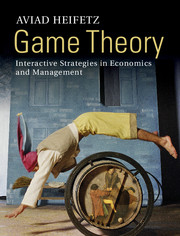Book contents
- Frontmatter
- Contents
- Foreword
- Part I Strategic interactions as games
- Part II Basic solution concepts for strategic form games
- Part III Prominent classes of strategic form games
- Part IV Uncertainty and mixed strategies
- Part V Advanced topics in strategic form games
- Part VI Dynamic games
- Part VII Repeated games
- 23 The repeated Prisoner’s Dilemma
- 24 Games with an unbounded horizon
- Index
- References
24 - Games with an unbounded horizon
additional models and results
from Part VII - Repeated games
Published online by Cambridge University Press: 05 August 2012
- Frontmatter
- Contents
- Foreword
- Part I Strategic interactions as games
- Part II Basic solution concepts for strategic form games
- Part III Prominent classes of strategic form games
- Part IV Uncertainty and mixed strategies
- Part V Advanced topics in strategic form games
- Part VI Dynamic games
- Part VII Repeated games
- 23 The repeated Prisoner’s Dilemma
- 24 Games with an unbounded horizon
- Index
- References
Summary
In the preceding chapter, we discussed the repeated Prisoner’s Dilemma. In this game, the extent to which a player can “punish” or “reward” her rival in any round is fixed and predetermined. What happens in repeated games in which this extent is modifiable? How does this affect the set of equilibria in the game? We will examine this question in the following example.
Efficiency wages
According to the competitive economics model, in a perfect and frictionless market there should be no unemployment: if the supply of labor is greater than the demand for labor on the part of employers, workers will be prepared to work even at a lower wage – a wage at which employers will find it profitable to hire additional hands. The process of decrease in salaries will continue until the demand for employees equals the supply of labor.
In practice, however, even in competitive markets such as that of the United States, unemployment levels typically do not fall below 4–5 percent. One possible reason for such unemployment is the process of job search on the part of the unemployed, and the search for workers by potential employers. We discussed the modeling of job search and unemployment in Chapter 9.
We will now turn to examine another possible cause for the existence of a minimal level of unemployment, one that is related to the ongoing and repeated interaction between employers and employees.
- Type
- Chapter
- Information
- Game TheoryInteractive Strategies in Economics and Management, pp. 413 - 440Publisher: Cambridge University PressPrint publication year: 2012



